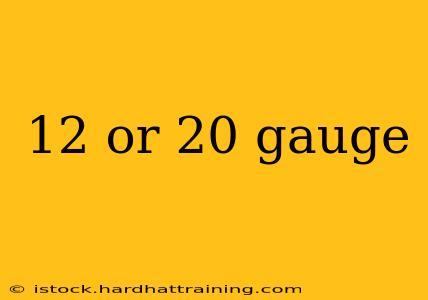12 Gauge vs. 20 Gauge: Choosing the Right Shotgun for You
Choosing between a 12-gauge and a 20-gauge shotgun can feel overwhelming, especially for new shooters. Both are popular choices, but they cater to different needs and preferences. This guide breaks down the key differences to help you decide which gauge is right for you.
Recoil: A Major Consideration
Perhaps the most significant difference lies in recoil. The 12-gauge, with its larger shell and heavier charge, delivers a considerably stronger kick. This can be tiring for beginners or those with less upper body strength. The 20-gauge, on the other hand, is noticeably softer-shooting, making it more manageable and enjoyable for extended shooting sessions. For younger or smaller shooters, the reduced recoil of the 20-gauge is a significant advantage.
Shell Availability and Cost
Shell availability is another crucial factor. 12-gauge ammunition is ubiquitous. You can find it virtually anywhere that sells shotgun shells, from big-box stores to small, rural shops. The sheer variety of 12-gauge ammunition, including different shot sizes, loads, and types, is unmatched. 20-gauge shells are readily available, but the selection might be slightly more limited, particularly in more specialized loads. Generally speaking, 20-gauge ammo tends to be slightly more expensive per round than 12-gauge.
Power and Range
While the 12-gauge packs a more powerful punch, the difference in stopping power between the two gauges isn't always dramatic, especially at hunting ranges. Modern 20-gauge ammunition is remarkably effective for many hunting applications, such as upland bird hunting or smaller game. The 12-gauge, however, retains a significant advantage for larger game, waterfowl hunting, and self-defense scenarios where maximum stopping power is paramount.
Weight and Handling
The weight and handling characteristics differ significantly. 12-gauge shotguns are generally heavier, which can contribute to the recoil but also provides better stability. This added weight can be advantageous for some shooters, especially when shooting from various positions. 20-gauge shotguns are often lighter and more nimble, making them easier to maneuver and swing quickly, ideal for quick target acquisition in fast-paced situations like sporting clays or bird hunting.
Summary Table: 12 Gauge vs 20 Gauge
| Feature | 12 Gauge | 20 Gauge |
|---|---|---|
| Recoil | Higher | Lower |
| Shell Availability | Extremely High | High |
| Cost | Generally Lower per round | Generally Higher per round |
| Power/Range | Higher | Lower, but still effective |
| Weight | Heavier | Lighter |
| Best Suited For | Larger game, waterfowl, self-defense | Upland birds, smaller game, beginners |
Choosing the Right Gauge: It's Personal
Ultimately, the best gauge for you depends on your individual needs and shooting style. Consider these questions:
- What will you primarily use the shotgun for? Hunting, sport shooting, home defense?
- What's your experience level? Are you a seasoned shooter or a beginner?
- What's your physical build? Can you comfortably handle the recoil of a 12-gauge?
- What's your budget? Consider both the initial cost of the shotgun and the ongoing cost of ammunition.
By carefully weighing these factors, you can make an informed decision and choose the shotgun gauge that's the perfect fit for your shooting needs. Remember to always prioritize safety and practice proper gun handling techniques.
